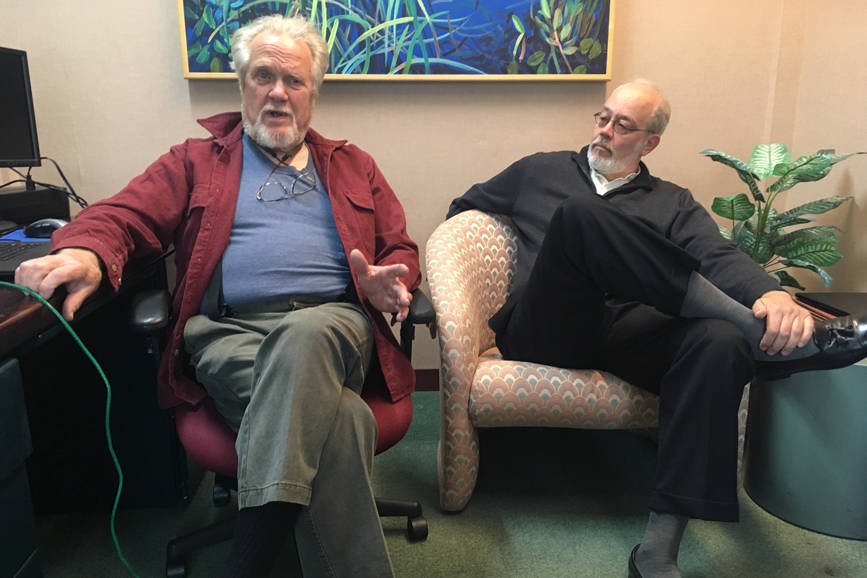A previous version of this article incorrectly stated that Mr. Forrer’s lawsuit against the Walker administration ultimately failed. That case was thrown out but Forrer appealed and it is now being reviewed. The article has been updated to reflect this change. The Empire regrets the error.
A Juneau man filed a lawsuit against the state of Alaska for using the revised program legislative requests process to allocate more than $900 million in federal coronavirus relief money.
Eric Forrer, a former University of Alaska regent who filed the suit, said using RPLs to allocate certain federal funds was unconstitutional and could only be done with an act of the Legislature.
“It won’t be a defensible action, it will lead into a spiral of legal and practical problems,” according to Forrer, who said the state was heading into a potential “rats’ nest” of legal problems if it followed through with the RPLs.
Forrer’s argument is similar to one made by some state lawmakers, who were hesitant to approve Gov. Mike Dunleavy’s proposal to use the RPL process to allocate federal relief money from the CARES Act.
The problem, according to some lawmakers, is that programs that don’t already have the legal ability to receive federal funds can’t get federal funds without the Legislature making an appropriation.
[Work on federal allocations goes into the evening]
Senate Minority Leader Tom Begich, D-Anchorage, and Rep. Chris Tuck, D-Anchorage, wrote a letter last week calling for the Legislature to return to Juneau and calling the governor’s RPLs unconstitutional. Legislative Affairs Agency Division of Legal and Research Services Director Megan Wallace cautioned some of the governor’s proposals would not be legal.
Forrer agrees, and he wants to see the Legislature reconvene and make the appropriations.
“They are in session,” Forrer said, urging lawmakers to begin work as soon as Friday morning. “The money will go out now, and I’ll fade into the shadows of the past.”
Forrer said he wasn’t convinced by arguments favoring the expediency of the RPL process based on the idea it is the fastest way to get much-needed funds to Alaskans citizens and municipalities.
“Under ordinary circumstances, the Legislature should behave in a constitutional way,” he said. “They should be falling over backwards to make sure what they’re doing is constitutional.”
This isn’t the first time Forrer has sued the state. In 2018, Forrer and Juneau lawyer Joe Geldhof sued the Walker administration for planning to borrow $1 billion to pay down state debt, a lawsuit currently under review.
Geldhof is representing Forrer once again and said he likes Forrer for his conviction.
“He’s one of the few remaining Alaskans who pays attention,” Geldhof said in an interview. “I’m a sucker for Forrer because he’s a principled guy.”
Lawmakers were avoiding their constitutional obligation, according to Geldhod, who said if a deeply divided body like Congress could pass trillions of dollars in the CARES Act, the Alaska Legislature could appropriate $900 million.
A lot of state lawmakers aren’t interested in returning to Juneau right away and don’t think the Legislature can be focused enough to tackle only COVID-19—related legislation in a timely manner. House Minority Leader Lance Pruitt previously told the Empire this Legislature lacked the discipline needed to put aside personal legislation.
[Back to Juneau? Some lawmakers think it’s time]
“I think that’s probably an accurate statement from the Minority Leader,” Geldhof said. “If that’s true why don’t we give the keys back to the Department of the Interior and admit we’re incapable of self-government?”
The lawsuit names Department of Revenue Commissioner Lucinda Mahoney, but she was chosen in an attempt to be nonpartisan, Goldhof said.
“You have to have a named person,” he said. “This isn’t about, in our minds, politics. This isn’t about Mike Dunleavy.”
Mahoney was named because in her role as DOR Commissioner she would allow CARES Act money to be distributed, even to recipients Forrer and Geldhof say are unconstitutional.
DOR did not immediately respond to request seeking comment.
Geldhof plans to submit an application for a preliminary injunction against the distribution of funds, “as early as 11:45 (Friday) and no later than close of business on Monday,” he said.
They said they would be willing to forgo the application, if the Legislature makes plans to reconvene, or the governor takes action to address the issue.
“We’re just trying to give the governor and the Legislature the opportunity to just follow the constitution,” Geldhof said. “You have to follow the constitution, it’s not aspirational.”
Dunleavy spokesperson Jeff Turner said the governor’s office does not comment on lawsuits. Assistant Attorney General at the Department of Law Maria Bahr said in an email, “the Department of Law will review the pleadings and respond in the appropriate time,” and cannot comment on ongoing litigation.

